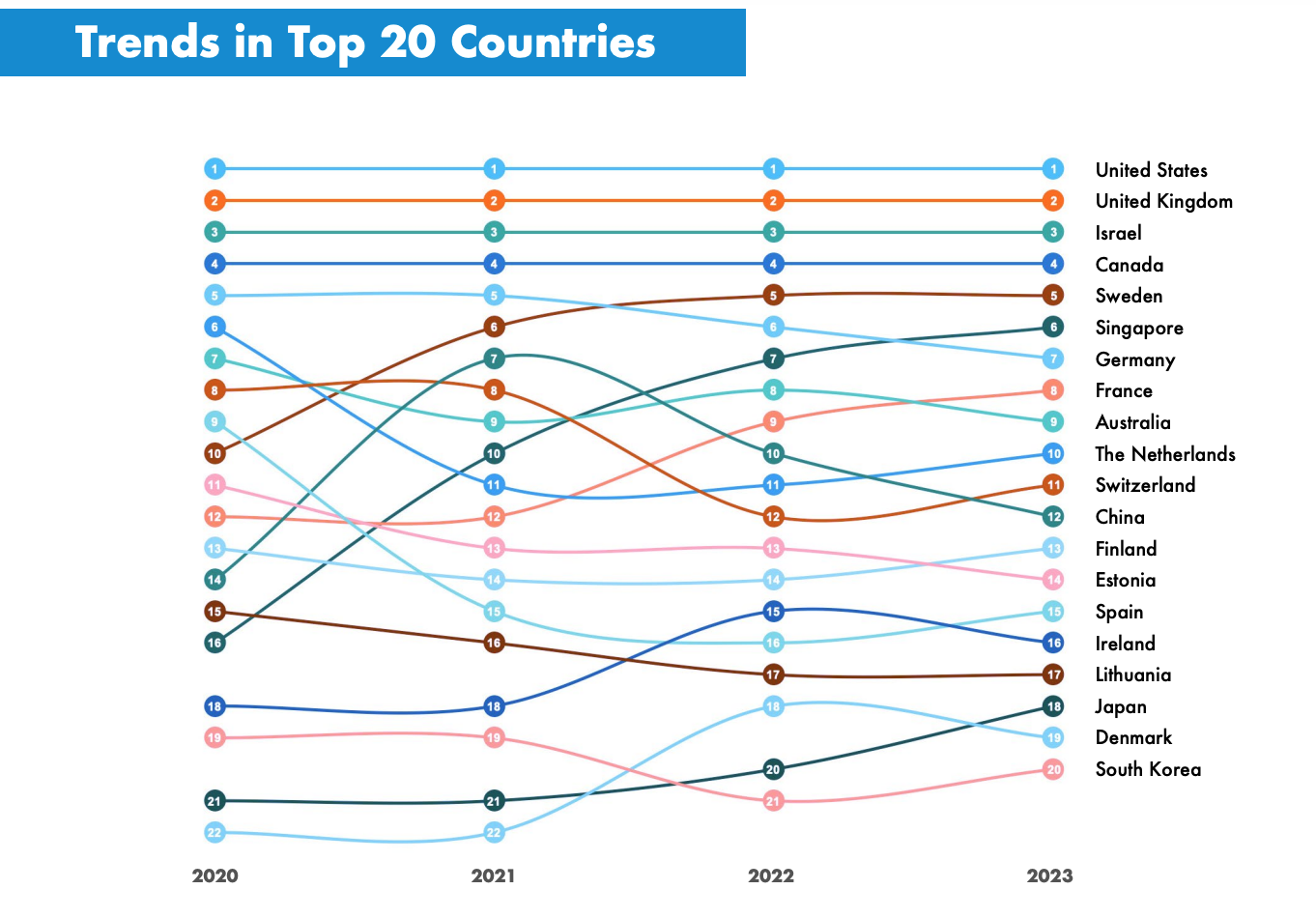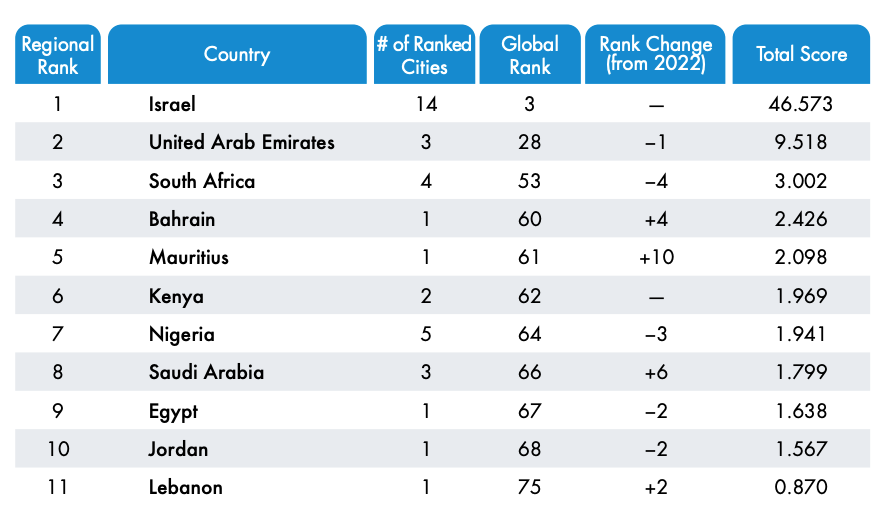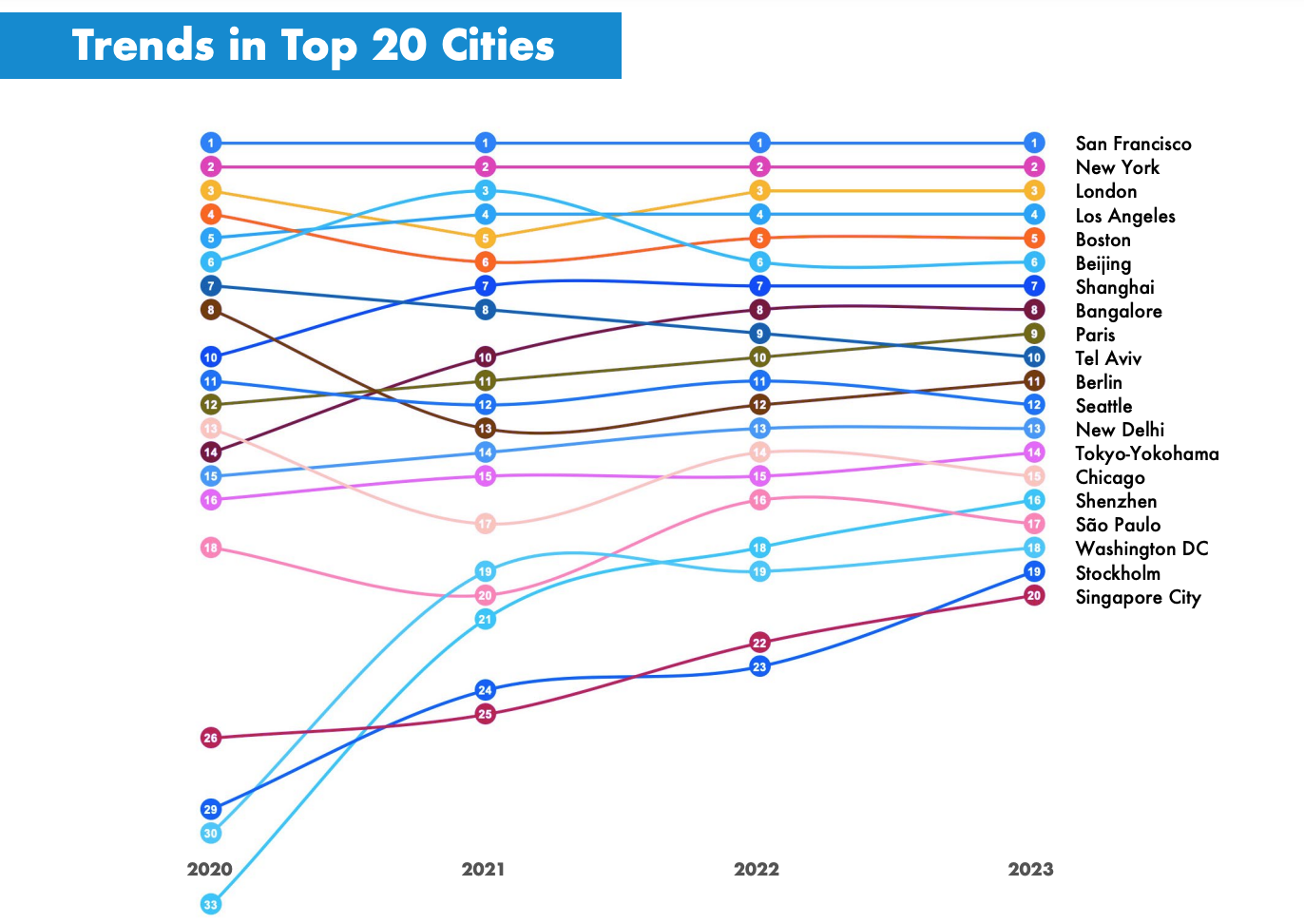For the fourth year in a row, Israel is being recognized as the largest and most advanced startup hub in the Middle East and Africa (MEA) region, commended for its large startup ecosystem, dynamic funding market and outstanding culture of innovation, a new report by startup ecosystem map and research center StartupBlink (based in Israel) claims.
The Global Startup Ecosystem Index Report, is an annual report that ranks the world’s top 100 countries and 1,000 cities, draws on hundreds of thousands of data points to determine the world’s top startup ecosystems and track both momentum and trends within these hubs.
Findings of this year’s study shows that Israel is maintaining its spot as the third most prominent startup ecosystem in the world this year, behind only the USA and the UK, as well as MEA’s top startup hub.

Trends in top 20 countries, Source: Global Startup Ecosystem Index 2023, StartupBlink
Israel came ahead of the United Arab Emirates (UAE), which ranked 2nd regionally and 28th globally, and South Africa, which ranked 3rd regionally and 53rd globally. Israel’s regional dominance is evidenced by its share in startup funding, which makes up for 53.3% of all funding going towards startups in MEA, the report says.
Other MEA nations represented in this year’s top 100 global ranking include Bahrain, Mauritius, Kenya, Nigeria, Saudi Arabia, Egypt, Jordan and Lebanon.

Middle East and Africa top 11 countries ranking, Source: Global Startup Ecosystem Index 2023, StartupBlink
Despite some turbulences and a relatively challenging business climate for startups, Israel has emerged into a tech powerhouse that has produced some of the world’s most successful startups, the report says, with apps like Waze, Wix, Fiverr, and Viber having made their mark around the world.
In the fintech sector, the country has been the birthplace of some of the industry’s most prominent players. A 2023 report by the Israel Securities Authority identified a total of 20 fintech unicorns originating from Israel, including paytech firm Rapyd, cross-border payment company Payoneer, accounting software provider Tipalti, fraud management specialist Riskified, as well as insurtech firms Lemonade and Next Insurance.
Other industries where Israel is excelling include autonomous driving, advertising, services and cybersecurity, the StartupBlink report says.
Looking at Israeli cities, the report ranked Tel Aviv, Israel’s star ecosystem, at the 10th position globally this year, ahead of prominent startup hubs including Berlin (11th), New Delhi (13th), Tokyo (14th) and Shenzhen (16th).
The city showed strength across multiple industries, ranking 6th globally for energy and environment, its best ranked industry, and 9th in transportation, the report notes. Tel Aviv ranked 7th globally in software and data, 8th in marketing and sales, 15th globally in both fintech and edtech, and 21st in foodtech.

Trends in top 20 cities, Source: Global Startup Ecosystem Index 2023, StartupBlink
The growth of fintech
Fintech has emerged into a prominent startup sector in the Middle East, North Africa and Pakistan (MENAP) region.
Between 2020 and 2022, investor funding for fintech startups in the region more than quadrupled from nearly US$200 million to approximately US$885 million, a new report by McKinsey says. Over the same period, the share of rounds exceeding US$10 million increased from 4% to more than 15%, showcasing that deal sizes are increasing as startups grow and mature.
The UAE, Saudi Arabia and Egypt have emerged into the region’s most prominent fintech hubs, attracting 37%, 25% and 20% of the region’s total fintech funding in 2022, respectively.

Fintech disclosed deals in the Middle East, North Africa and Pakistan (MENAP), Source: McKinsey and Company, May 2023
McKinsey expects MENAP fintech revenue to increase almost threefold in the next few years, owing to the region’s positive macroeconomic outlook and the consistently strong performance of MENAP’s financial services industry.
Annual revenue for MENAP fintech companies is expected to increase from US$1.5 billion in 2022 to an amount between US$3.5 billion and US$4.5 billion in 2025. The amount would boost fintech’s share of financial services revenue from less than 1% to approximately 2-2.5%.
In 2022, the market valuation of MENAP’s fintech sector stood at US$8 billion. That amount is set to increase to more than US$15 billion as early as 2025.
Featured image credit: edited from Unsplash








No Comments so far
Jump into a conversationNo Comments Yet!
You can be the one to start a conversation.